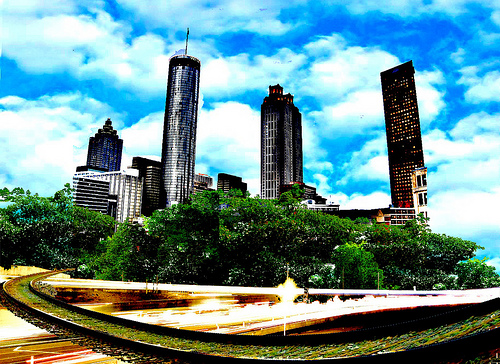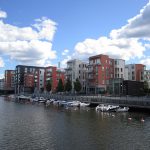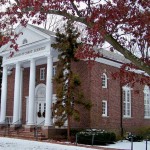Atlanta BeltLine transforms racial and economic rifts
Could transforming miles of abandoned railroad tracks tear down some of the racial and economic boundaries in Atlanta? That’s the hope, reports the National Journal. The Atlanta BeltLine is the city’s “most comprehensive transportation and economic development effort ever” and one of the largest projects of its kind in the U.S. It will provide 33 miles of trails, 1,300 acres of parks, and 5,600 units of affordable housing, as well as public art and historical preservation efforts. The plan is to connect dozens of neighborhoods and break down longstanding barriers in the process.

A vision of Atlanta’s future. Image from Jesse Budlong.
Atlanta’s transportation policy has long been used to isolate people by both race and class. These were conscious decisions. As Paul Morris, CEO of Atlanta BeltLine Inc., points out, the train tracks were designed to establish and reinforce boundaries between neighborhoods. “In most cases, those neighborhoods on one side of the railroad not only were across the tracks from another side, they literally did not connect — nor were they intended to connect,” says Morris. “That was a social decision, as well as a physical, infrastructure decision.”
While the BeltLine, a project comparable to New York City’s High Line, was first conceived as a way for Atlanta residents to move around their traffic-plagued city more easily, another goal has emerged: “stitching the city together.” Proposed as a mass transit project in 1999 by a Georgia Tech student, the BeltLine will connect 45 neighborhoods in metro Atlanta. Local taxes will cover around a third of the cost, $1.4 billion, while federal funding and other public and private partnerships will contribute another $179.5 million, reports Fox.
One particular area of Atlanta, the Old Fourth Ward, is a good example of the BeltLine’s impact. It’s where the National Journal notes, “segregation forced a complete ecosystem to develop…with African-American wealth, businesses, and the working class all in the same area. Doctors lived next to teachers and janitors. Following desegregation, the wealthy left for the suburbs, and the area went into decline.” The neighborhood became home to one of the city’s highest crime rates.
But over the last five years, the Old Fourth Ward has become one of the city’s trendiest areas, thanks in large part to the BeltLine. The tracks and thickets that isolated the neighborhood from a nearby park were paved over to create a trail. The city invested $750 million in the neighborhood, developed thousands of housing units, and completed a new $50 million park. The area is home to the Center for Civil and Human Rights, as well as a new Atlanta Streetcar system which passes by the Martin Luther King Jr. National Historic Site.
These developments are driving up housing prices in the redeveloped areas, forcing some to question whether economic discrimination will drive out residents the way racial discrimination formed the neighborhoods in the first place. While the BeltLine does provide financial grants and loans, and 20% of new housing is considered affordable housing, some advocates say that these efforts are not sufficient.
Hattie Dorsey, an Old Fourth Ward resident told the National Journal, “If I had not moved here 10 years ago, there would be no way in hell I would be able to afford it, because I’m a retiree.” Dorsey is the founder and former president of the Atlanta Neighborhood Development Partnership. “I couldn’t afford it,” she said, “and perhaps sooner or later the taxes would push me out. There is no plan in place to make certain that people who have lived here, who sacrificed and stayed through the bad times, stay through the good times.”
Even so, the project has still earned praise. The International Real Estate Federation recognized the Beltline as “the best environmental rehabilitation project in the world.” It’s received the EPA’s Overall Excellence Award for Smart Growth Achievement and positive reviews local advocates. As Rebecca Serna, executive director of the Atlanta Bicycle Coalition, sums up: “It is that vision for the kind of city we want to be, that is connected and has cool neighborhoods, and you can get around, and you interact with your neighborhoods, and you just run into people…All the good things that cities do, the BeltLine exists physically and psychologically as that space.”
Related Posts
Category: Infrastructure, News

















